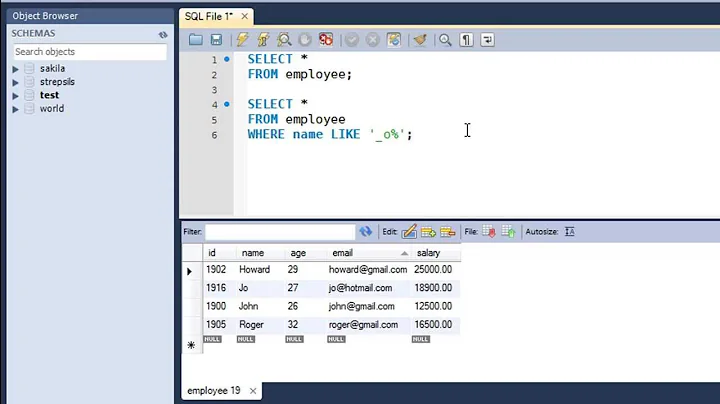LIKE clause is not working in SQL server
Solution 1
You get an empty result because there is no row in your table where DocID is like both %DSRB% and %DHA% at the same time. You don't say in your question, but I guess you are expecting to receive the two rows with DocIds DHA12 and DSRB23.
To do this, you need to select rows where DocID is like either %DSRB% or %DHA%. Try changing the AND in your WHERE clause to an OR:
SELECT DocId, NSN, Qty, RequestDate, ReceiveDate
FROM Orders
WHERE (DocID LIKE '%DSRB%') OR (DocID LIKE '%DHA%')
See this introduction to SQL Logical Operators if you want more examples.
Solution 2
If you want to find rows that contain either XX or YY, you need to use OR:
SELECT DocId, NSN, Qty, RequestDate, ReceiveDate
FROM Orders
WHERE (DocID LIKE '%DSRB%')
OR (DocID LIKE '%DHA%')
Solution 3
Don't you want an OR in there instead of an AND?
Solution 4
Make it "OR" instead of "AND". At this point, you're saying both clauses in the "WHERE" have to be true.
Solution 5
Are you sure you need AND? You have no records shown that meet those requirements. I think you may want OR, which should return two records.
Related videos on Youtube
Besho 87
Updated on June 04, 2022Comments
-
Besho 87 almost 2 years
I have a table which have the following columns in SQL Server 2005:
DocID NSN QTY ----------------- DHA12 32 5 DSRB23 22 45 TF22 70 23Whenever I perform the following query to get all the NSN which have a DocId that starts with either DSRB or DHA, it gives me empty set:
SELECT DocId, NSN, Qty, RequestDate, ReceiveDate FROM Orders WHERE (DocID LIKE '%DSRB%') AND (DocID LIKE '%DHA%')I guess the problem with having two LIKE clauses because when I delete the last LIKE clause, the query works fine.
-
marc_s about 13 yearsIF you want to search for something that starts with a string of char, you should use
LIKE 'DHA%'- in that case, SQL Server has a chance of using an index that might be present, to speed things up. If you use the expression you have now (LIKE '%DHA%'), you search for something that contains those three letters anywhere in the string, and SQL Server has no chance at all to use any index - even if it were present.
-







